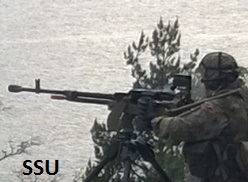This one might be a bit different in that the people likely would rather eat than fight for the regime that has lorded over them for eighty years.
But defeating their armed forces ain't like defeating Iraq's armed forces either..
Still, for an insurgency to work, the populace has to want to fight occupation. But in this case they would be reunited with their own people in the South. I am not sure insurgency is the big issue here. I might be wrong, though.
North Korea fires another missile...What will the fall of North Korea look like?
-
Speaker to Animals

- Posts: 38685
- Joined: Wed Nov 30, 2016 5:59 pm
-
Smitty-48
- Posts: 36399
- Joined: Wed Nov 30, 2016 3:22 am
Re: North Korea fires another missile...What will the fall of North Korea look like?
If the DPRK was so rickety as to be on the verge of collapse, methinks it would have collapsed decades ago, but notice that it hasn't, I don't think the North Koreans view the world through the lense of the American media, and I don't think they would necessarily react, to an attack which would be necessarily violent to the point of destroying the country, as a liberation.
They wouldn't obey an order from their chain of command to retaliate with medium ranged nuclear ballisitic missiles against US forces in theatre? Seems a little optimistic, as near as I can tell, the North Koreans appear to obey orders without question, somebody is obeying orders up there, if they wanted to overthrow the regime, they've had ample opportunity, and yet they never do.
Are the North Koreans brainwashed? Perhaps, but whoever said brainwashing doesn't work?
They wouldn't obey an order from their chain of command to retaliate with medium ranged nuclear ballisitic missiles against US forces in theatre? Seems a little optimistic, as near as I can tell, the North Koreans appear to obey orders without question, somebody is obeying orders up there, if they wanted to overthrow the regime, they've had ample opportunity, and yet they never do.
Are the North Koreans brainwashed? Perhaps, but whoever said brainwashing doesn't work?
Nec Aspera Terrent
-
ssu

- Posts: 2142
- Joined: Thu Dec 01, 2016 4:05 pm
Re: North Korea fires another missile...What will the fall of North Korea look like?
I think they haven't had famines for some time now. Basically they had to ease with the communism and the implementation of the Juche ideology in economics in order for the people to survive. So there's a "grey" economy in North Korea that keeps basically the country up.
Wonder how that country would actually collapse.
Wonder how that country would actually collapse.
-
Martin Hash

- Posts: 18721
- Joined: Wed Jan 20, 2010 2:02 pm
Re: North Korea fires another missile...What will the fall of North Korea look like?
Propaganda & indoctrination work indefinitely until some outside force pressures the status quo.
Shamedia, Shamdemic, Shamucation, Shamlection, Shamconomy & Shamate Change
-
KerningChameleon
- Posts: 226
- Joined: Sat Dec 03, 2016 12:53 am
Re: North Korea fires another missile...What will the fall of North Korea look like?
I think it should be noted that the South Koreans themselves have a vested interest in maintaining the status quo as long as possible for two big reasons. First, SK's economy is riding high now. You can debate all you like if it'll end up following the same trajectory as Japan's and their continuing "Lost Decade...s", but for the moment they feel like they're on top of the world (nutbar cultist Prime Minister aside). They really don't want anything to rock that boat, and having to deal with a regime collapse/military invasion of the North is the definition of boat rocking.
The other reason is... well, they kinda don't care so much anymore. Before, there was constant "Day of Unification" with their trapped cousins talk amongst the SK people, but now there are entire generations growing up having never known anything but the Eternal Ceasefire. They don't see the people of the North as their countrymen or family, just... foreigners in a perhaps very unfortunate situation but not really their problem. As it's a common comparison, I'd say the East Germans are very lucky the Iron Curtain fell when it did, in hindsight. Even then, to this day there exists "The Wall in people's minds" throughout Germany. To say nothing of the massive economic hit the country took in the years after Reunification, and how even that pales in comparison to what Korea would have to go through.
Defectors and escapees may try their damnedest to make anyone they can care with relentless, practically hysterical propaganda campaigns, but the South Koreans have grown comfortable and distant. "Make Korea Whole Again" has faded into "Keep South Korea Great".
The other reason is... well, they kinda don't care so much anymore. Before, there was constant "Day of Unification" with their trapped cousins talk amongst the SK people, but now there are entire generations growing up having never known anything but the Eternal Ceasefire. They don't see the people of the North as their countrymen or family, just... foreigners in a perhaps very unfortunate situation but not really their problem. As it's a common comparison, I'd say the East Germans are very lucky the Iron Curtain fell when it did, in hindsight. Even then, to this day there exists "The Wall in people's minds" throughout Germany. To say nothing of the massive economic hit the country took in the years after Reunification, and how even that pales in comparison to what Korea would have to go through.
Defectors and escapees may try their damnedest to make anyone they can care with relentless, practically hysterical propaganda campaigns, but the South Koreans have grown comfortable and distant. "Make Korea Whole Again" has faded into "Keep South Korea Great".
"Old World Blues.' It refers to those so obsessed with the past they can't see the present, much less the future, for what it is. They stare into the what-was...as the realities of their world continue on around them." -Fallout New Vegas
-
ssu

- Posts: 2142
- Joined: Thu Dec 01, 2016 4:05 pm
Re: North Korea fires another missile...What will the fall of North Korea look like?
Ask how many Germans would want their country to be still divided. You won't find many that think it was a disaster that East Germany collapsed. Never underestimate patriotism and nationalism.KerningChameleon wrote:I think it should be noted that the South Koreans themselves have a vested interest in maintaining the status quo as long as possible for two big reasons. First, SK's economy is riding high now. You can debate all you like if it'll end up following the same trajectory as Japan's and their continuing "Lost Decade...s", but for the moment they feel like they're on top of the world (nutbar cultist Prime Minister aside). They really don't want anything to rock that boat, and having to deal with a regime collapse/military invasion of the North is the definition of boat rocking.
The other reason is... well, they kinda don't care so much anymore. Before, there was constant "Day of Unification" with their trapped cousins talk amongst the SK people, but now there are entire generations growing up having never known anything but the Eternal Ceasefire. They don't see the people of the North as their countrymen or family, just... foreigners in a perhaps very unfortunate situation but not really their problem. As it's a common comparison, I'd say the East Germans are very lucky the Iron Curtain fell when it did, in hindsight. Even then, to this day there exists "The Wall in people's minds" throughout Germany. To say nothing of the massive economic hit the country took in the years after Reunification, and how even that pales in comparison to what Korea would have to go through.
Defectors and escapees may try their damnedest to make anyone they can care with relentless, practically hysterical propaganda campaigns, but the South Koreans have grown comfortable and distant. "Make Korea Whole Again" has faded into "Keep South Korea Great".
One thing is for South Koreans to be OK with the present realpolitik situation. Totally another thing is would be if North Korea collapsed and there would be a possibility for a peaceful unification of the whole peninsula. Yes, it would be expensive and some Southerners would bitch about the costs (as some Germans did), but in reality they just bitch yet pay.
I think the real threshold is that South Koreans wouldn't likely go into a war to unite Korea, if let's say there would be a revolution in North Korea that would become a civil war.
-
KerningChameleon
- Posts: 226
- Joined: Sat Dec 03, 2016 12:53 am
Re: North Korea fires another missile...What will the fall of North Korea look like?
As recently as 2014:ssu wrote:Ask how many Germans would want their country to be still divided. You won't find many that think it was a disaster that East Germany collapsed. Never underestimate patriotism and nationalism.
One thing is for South Koreans to be OK with the present realpolitik situation. Totally another thing is would be if North Korea collapsed and there would be a possibility for a peaceful unification of the whole peninsula. Yes, it would be expensive and some Southerners would bitch about the costs (as some Germans did), but in reality they just bitch yet pay.
I think the real threshold is that South Koreans wouldn't likely go into a war to unite Korea, if let's say there would be a revolution in North Korea that would become a civil war.
Given the rapidity of economic growth and the speed of political and social changes in South Korea since the republic’s founding, it should come as no surprise that generational differences are sometimes significant. Recent scholarship focuses on some of these differences, taking particular note of the “new” national identity taking shape among the 20s age cohort, sometimes referred to as the yishipdae. Survey data, released in a report earlier this week by the Seoul-based Asan Institute for Policy Studies, points to the crystallization of a new South Korean national identity vis-a-vis North Korea, especially among South Koreans in their 20s.
Based on a sample of 1,000 people polled in September 2014, the report finds that South Koreans in their 20s are less receptive to the idea of unification than are older age cohorts. Further to that, the yishipdae do not consider North Koreans to be part of the same “bloodline” as them; in other words, North Koreans belong to a different nation. The authors, close watchers of changes and variations in public opinion data over time, are not surprised. “This youth detachment from North Korea is perhaps the most important recurring theme in the public opinion data over the past five years,” they write. Feelings of difference are reflected in answers to several of the questions asked. A summary of the report, written by the Wall Street Journal’s Jonathan Cheng, can be read at Korea Real Time.
...
First: a question about differences. Respondents were asked what divides North and South Korea. Given three options (different political systems, different economics levels, or values), all age cohorts either choose “economic levels” or “political systems” as that which divides the two Koreas. However, a closer look at the 20s age cohort shows “values” (33.7 percent) just barely behind the most popular choice “political systems” (34.9 percent). No other age cohort had even 30 percent of respondents emphasize the role of values in the Korean division; among the the 60+ cohort, only 14.1 percent did so. This is telling.
Many of those in their 20s have grown up knowing nothing other than a (mostly) democratic South Korea. More importantly, they grew up amid plenty. Their developmental experiences were in many ways fundamentally different from those of their parents and grandparents. As socialization theories would predict, this seems to have resulted in young South Koreans feeling as if they are divided from the North not just by different political and economic systems, but also at a deeper level: values. (Of course, public opinion data, like that presented here, cannot “prove” this causal link.)
Despite the efforts to connect with South Korea’s youth, interest in reunification is lowest among the 20s age cohort. That the yishipdae are less interested in reunification than their elders are is another indication of the generational divides in South Korean society with regards to North Korea. (Support for reunification in 2010 was low across all age cohorts, no doubt the consequence of North Korea’s deadly provocations that year.)
In addition to a “values” difference, a plausible reason for the weak interest (among many) in reunification put forth by those writing on the subject, and addressed in the report, is the decline (slow but steady) of ethno-nationalism in South Korea. As ethnicity is replaced by some other basis for collective identity, so too will support for reunification; if North Koreans are not perceived to be of the same national ilk, then it seems only natural that interest in reunification would decline.
"Old World Blues.' It refers to those so obsessed with the past they can't see the present, much less the future, for what it is. They stare into the what-was...as the realities of their world continue on around them." -Fallout New Vegas
-
ssu

- Posts: 2142
- Joined: Thu Dec 01, 2016 4:05 pm
Re: North Korea fires another missile...What will the fall of North Korea look like?
[quote="KerningChameleon"]
As recently as 2014:
So, according to those polls in the article you gave, in 2012, just two years from 2014, a whopping +75% of the South Koreans in their 20's were in favour of unification. And still in 2014 the majority of South Koreans (assuming the demographics of the country are ordinary) are very favourable to that. Hard to find Americans agreeing on something with those quantities of majority.
And basically there is absolutely no view now that North Korea would be collapsing or the situation would be changing. Only then this would be truly important as it would be a genuine possibility. I assume if you would have asked young Germans about East Germany in the 1980's and a possible unification, I think many would have been totally OK with East Germany and didn't have passionate desire for unification. Soviet Union was here to say, then. Only when the East Germans voted with their feet did the Westerners wake up.
Now obviously there's some change in the young generation, but I wouldn't call it such a dramatic change that basically South Koreans would be against a peacefull unification (in the way of Germany). Or that they have "a vested interest in maintaining the status quo as long as possible" as you said.
As recently as 2014:
So, according to those polls in the article you gave, in 2012, just two years from 2014, a whopping +75% of the South Koreans in their 20's were in favour of unification. And still in 2014 the majority of South Koreans (assuming the demographics of the country are ordinary) are very favourable to that. Hard to find Americans agreeing on something with those quantities of majority.
And basically there is absolutely no view now that North Korea would be collapsing or the situation would be changing. Only then this would be truly important as it would be a genuine possibility. I assume if you would have asked young Germans about East Germany in the 1980's and a possible unification, I think many would have been totally OK with East Germany and didn't have passionate desire for unification. Soviet Union was here to say, then. Only when the East Germans voted with their feet did the Westerners wake up.
Now obviously there's some change in the young generation, but I wouldn't call it such a dramatic change that basically South Koreans would be against a peacefull unification (in the way of Germany). Or that they have "a vested interest in maintaining the status quo as long as possible" as you said.
